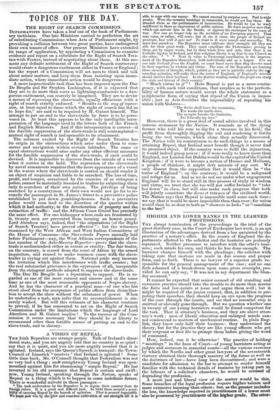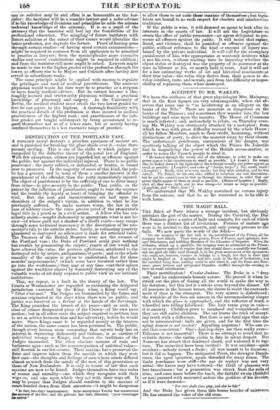HIGHER AND LOWER RANKS IN THE LEARNED PROFESSIONS.
THE abrupt termination of the proceedings in the trial of the great distillery case, in the Court of Exchequer last week, is an apt' illustration of the advantages derived from a bar untainted by the practice of a notary's office. In the courts of England the de- partments allotted to the solicitor and the barrister are jealously separated. Neither presumes to interfere with the other's busi- ness; each minds his own, and thinks he has done enough. The barrister charges himself with the pleadings ; the solicitor with taking care that motions are made in due season and proper form, and so forth. There is no lawyer of a superior grade re- sponsible for the general management of the case ; and no one feels ashamed of a break-down upon some gross oversight, pro- vided he can only say, " It was not in my department the blur der occurred."
It cannot be expected that senior counsel of old standing and extensive practice should take the trouble to do more than master the fats and law-points at issue and argue them well ; but it might be required of the junior counsel, that, in addition to pre- paring their speeches, they should keep an eye upon theprogress of the case through the courts, and see that no essential step is omitted or slovenly gone through. But we question whether one in twenty of our young barristers would be found competent for the task. That is attorney's business, and they are above attor- ney's work : men of liberal education and enlarged minds can- not condescend to matters of mechanical routine. In plain Eng- lish, they know only half their business : they understand the theory, but for the practice they are like young officers who get their, sergeant or first file to prompt them before giving the word of command. - How, indeed, can it be otherwise? The practice of holding " mootings " in the Inns of Court—of young barristers acting as judges and assessors in manorial courts—all the various exercises by which the Norths and other great lawyers of the seventeenth century obtained their thorough mastery of the forms as well as the doctrines of law—have long been discontinued ; and were a candidate for admission to the bar to attempt to render himself familiar with the technical details of business by taking part in the labours' of a solicitor's chambers, he would be accused of degrading the profession. A morejust and liberal view of the matter would be this. Some branches of the legal profession require higher talents and more extensive learning than others ; but, as the greater includes the less, the knowledge required in practitioners of a lower must also be possessed by practitioners of the higher grade, The attor- nyey.or ,aolicitor may be and often is tie honourehle as the liar-- rater: barrister will be asounder lawyer and a safer ,adviser if lex his knowledge of de citione and printsplea he edde the minute technical knowledge of the attorney. It is as pupil of the attorner that, the barrister will best lay the- foundations of his p�rooffessional education. The mingling of future' barristers with future solicitors at the outset of.their tamer would liberalize the lotterprefesaion, not degrade the former. -Proof of having gone through certain studies—of having stood certain examinations— might berequired in common from all applicants to be admitted to practise as lawyers; from the special-pleader snore _extensive studies and severe examinations might be required in addition ; and from the barrister still more might be.asked. Lawyers might be made to rise to the higher grades of the profession through the lower, as officers rise to be Majors and Colonels after having first served in subordinate ranks.
The same principle might be applied with success to regulate the privileges and rank of medical practitioners. The eminent physician would waste his time were he to practice as a surgeon or mere family medical adviser. But he cannot become a tho- roughly learned and trustworthy physician without a practical knowledge of pharmacy and surgery. In the University of Berlin, the medical student must attain the two lower grades be- fore he can aspire to the highest. A thorough familiarity with the practical details of the profession is thus. insured in medical practitioners of the highest rank ; and practitioners of the infe- rior .grades are taught self-respect by being accustomed to re- gard themselves not as of a lower caste, but as merely having confined themselves to a less extensive range of practice.



























 Previous page
Previous page